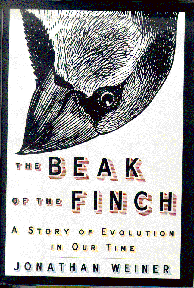
Jonathan Weiner. Alfred Knopf, New York, 1994.
In this superb account of field biologists in action, a talented science writer tells the story of two Princeton University evolutionary biologists, Peter and Rosemary Grant, engaged in the long-term study of Darwins Galapagos finches. This work is of enormous significance because it studies evolution not through fossils, but in real time, evolution in the act of happening as we watch. For more than twenty years the Grants and their students have monitored generation after generation of finches on one small Galapagos island, Daphne major, measuring beak size, weighing, and observing the birds. The finches the Grants study eat seeds, and over the years that the Grants watch, radical changes in climate in some dry years dramatically alter the nature of the available seeds — and in a brief span of years the Grants see the beak of the finch adapt, thicker beaks becoming more common in dryer periods. Few studies more directly reveal evolution in action, and few accounts are as well done as this one.